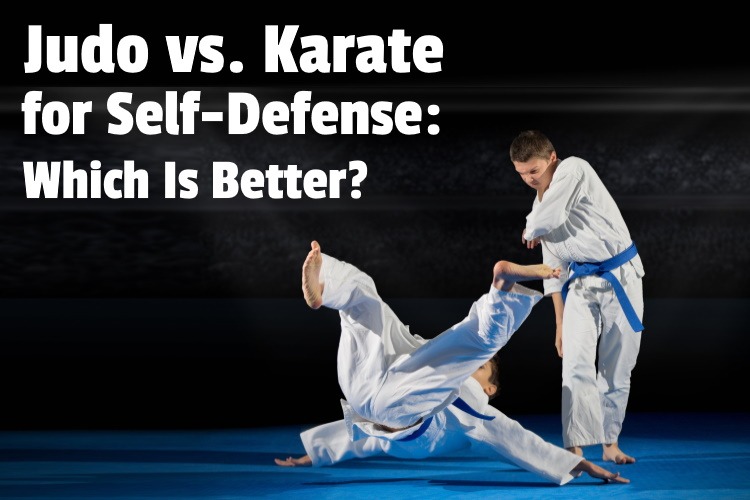
When people first think of martial arts, Karate is often the 1st thing they think of. Judo, on the other hand, is lesser-known but has been an Olympic sport far longer. But in case you find yourself in a dangerous situation, let’s explore Judo vs. Karate for self-defense: which is better?
Here’s what I know from doing a little of both:
Karate works better for self-defense than Judo. Judo is a grappling art where most deadly techniques happen on the ground, while Karate’s focus is striking and kicking. Also, many of Judo’s techniques work best when wearing a gi and rolling on padded mats and can be problematic in a real fight.
Judo is all about leverage, using the opponent’s strength and momentum against them. “Fighting” in such a way that one avoids hurting the opponent.
The Judoka (judo practitioner) rarely protects his face (which makes them more vulnerable). On the other hand, Karate is more directed at harming one’s opponent — striking and kicking them! In a real fight, Judo would probably be unrealistic. The reality is that both complement each other greatly.
I have been involved in martial arts on and off my whole life and seriously for 7 years. In this article, we’ll explore some vital distinctions between Judo and Karate and why Karate would serve you better.
Let the fun begin…
As Kotsoiev’s right arm came high, @varlamliparteliani caught it and dropped under for a lightning fast drop Seoi! He really is one of the greatest Judoka of this generation, such incredible longevity!#JudoMasters #Judo @qatar_olympic
© IJF Media Team – Robin Willingham pic.twitter.com/aMqS2vQA1P
— Judo (@Judo) January 13, 2021
Is Karate good for self-defense?
Karate works well for self-defense given its focus on punches, kicks, and the ability to successfully block an opponent’s strikes. There are several successful MMA fighters who, while knowing more than 1 martial art, credit their success to Karate.
Georges St-Pierre is regarded by many as perhaps the best MMA fighter that ever rolled in the Octagon. He’s credited a considerable chunk of his success to Karate.
There are also other top-notch fighters such as Lyoto Machida who employ Karate to crush their opponent. He is a black belt in Shotokan Karate.
Jon “Bones” Jones is one of the most dreaded fighters in the UFC. He uses two lethal Karate techniques: elbow strikes and kicks to the knee.
Karate is essentially strikes and kicks. There’s also a bit of grappling in traditional Karate. This is hardly taught or stressed in most modern styles.
Karate is good for self-defense because in most fights, the intent is to hurt the other, and this can be achieved if one’s good with strikes and kicks.
If a punch or kick connects with the target, it can have a really painful impact.
This is definitely what you want in a street brawl. It’s not easy to grapple well in a real fight, especially if the other party is “skilled.” They’ll be doing all they can to avoid being held and thrown.
It’s easy to grab someone who’s wearing a Gi, but an assailant might be wearing a simple T-shirt. (Some crazies would even remove and fling their clothes before a fight). If you’ve been focused on grabbing people’s clothes, there’s nothing to grab here!
But, a trained Karateka (Karate practitioner) can disable or even incapacitate someone who’s trying to hold them. In fact, being too close to a Karateka in a fight could be suicidal.
After all, some strikes and kicks could knock out an opponent.
Action from today’s @GKRKarateR1 National Championships in Sheffield #karate #freelance #photography #sport pic.twitter.com/qRK67bYz1k
— Steve Porter (@steveporterpics) November 16, 2019
Is Judo more effective than Karate?
Judo is not as effective as Karate. Judo is visually impressive and works great in a dojo on the mats. But with this martial art, you win after a takedown and submission. Street fights are not like that. Most people don’t stop fighting until they are unable to, or someone comes and stops the fight.
If a Judoka can grab and throw an assailant, they’ll temporarily have an edge.
That’s if the other party knows nothing about the art of falling (one of the techniques one learns in Judo). If the assailant is strong, they’ll keep fighting with all they have, even while on the ground.
Their legs and hands are still lethal weapons.
A takedown can’t stop an excellent Karateka. Karate is more effective because it’s more proactive and focused on consciously inflicting harm on the other, while Judo is softer and defensive.
Whether standing up or while on the ground, a Karateka is deadly. Most Judo guys could become less effective once they’re on the ground.
That’s not to suggest that there are no techniques to handle being on the ground. There are, but if a person has trained in a Judo style that stresses the sport aspect, some of these deadly ground maneuvers may not have been taught or mastered.
As long as a Karateka can move their arms and legs, they’re a lethal weapon.
Kicks to the liver, repeated elbow strikes to the head or neck, can stop, if not cripple, a Judoka. The idea of leveraging an opponent’s strength and momentum against them could be effective against someone clueless about fighting.
And with all the Karate blocks available, a Karateka can easily defend against almost any Judo attack other than throws.
But against another trained fighter, they’re already clued-in to the danger, and they’ll resist it with all they’ve got.
Two years ago, @Judo embraced a new, independent model to fight for #cleansport and delegated its entire #antidoping program to the ITA. Since then, we’ve been committed to #KeepingJudoReal for the members, fans & judoka all around the world.#KeepingSportReal pic.twitter.com/8bcyIclOwQ
— International Testing Agency (@IntTestAgency) January 14, 2021
Does Judo work in a street fight?
Judo can work in a street fight, especially if the assailant is not a skilled fighter, which is the most likely scenario. Most trained fighters don’t go about looking for fights. A Judoka’s best tactic is to sweep or throw the attacker, knock them to the ground and leave the scene to avoid further injury.
I say flee as that’s honestly the best tactic for even skilled fighters when they find themselves in a street fight.
That’s because, unlike a dojo with mats and rules, in a street fight, anything goes. The attacker may have friends just around the corner, or they could also have a knife or a gun. Temporarily disabling them and leaving the scene quickly is the best way to avoid getting seriously hurt or killed.
One of Judo’s best points is the art of easily unbalancing an opponent and using their strength and momentum against them, which will effectively work when used in a street fight.
An angry and strong attacker rushing at an excellent Judoka is not a scary sight for the latter.
There’s a way the Judoka would position himself in such a way that before the attacker knows what’s going on, they’re already groaning on the floor. Most Judokas are great at footsweeps. It sounds like something innocuous but can be lethal when properly executed.
In most cases, they won’t be hip to Ukemi, one of the moves taught in Judo, where you’re taught how to fall gracefully and smartly, to minimize or even prevent injuries when you’re thrown. Yes, Judo can be effective in a street fight.
There’s something psychologically and physically depressing about being on the ground while someone one has attacked is standing in a strange stance that one has probably only seen in a movie.
And even more scary is the fact that untrained fighters can break their bones when thrown.
You might be wondering, is Judo something you could teach yourself?
Or do you have to go to a dojo? I explored this issue in a recent article of mine. I showed that if you’re determined and consistent, you could teach yourself. And, I offered a couple of surefire ways to go about it.
Just click the link to read it on my site.
32 competitors. 1 winner. 10K prize. Winner takes all. Congratulations to Jordan Thomas who beat René Smaal in the final!
Blitz Fighter Lite 8oz Karate Suit is the Official Gi of the 10K Karate Clash.
📷 Jorden Curren Photography & Fighters Inc. #10KKarateClash #Karate pic.twitter.com/ei3Yv3gcrV— Blitz (@BLITZSPORT) April 11, 2018
Are Karate punches stronger than Judo punches?
Karate punches are much stronger than Judo punches. That’s because there’s no real punching in Judo. It’s essentially a grappling art. Grappling throws, and joint locks, that’s Judo in a nutshell. While there are some arm striking techniques used in Judo, they aren’t typically straight punches.
This is one of the reasons Karate is better and more popular than Judo. If you think about it, there’s something highly natural, almost instinctive about punches.
When we’re about to fight someone, most of us hardly think of grabbing and throwing them.
Punching them in the nose or on the head is often our first natural move. So, there’s no question of Judo punches being stronger. There are no punches! Imagine that you’re trying to grab someone, and they’re unleashing a flurry of deadly punches to your head. How motivated would you be to go the whole hog?
Interesting, right? But you might be wondering, is Karate something you could teach yourself?
Or is it compulsory you’ve got to go to a dojo? I explored this issue in a recent article of mine. I showed that if you’re motivated, you could teach yourself, and I offered a couple of practical ways to go about it.
Just click the link to read it on my site.
Throwin’ it back (literally) to Baku World Champs 💪🔥☝️ pic.twitter.com/9B0okxWgIS
— Judo (@Judo) January 29, 2021
Can a Karate fighter beat a Judo fighter?
An equally trained Karate fighter can beat a Judo fighter. Grappling is powerful, but it’s often not enough against the wider variety of techniques used in Karate. Karate has throws and sweeps just like Judo, but Judo doesn’t use most of the punches and kicks employed in Karate.
Khabib “The Eagle” Nurmagomedov is probably the best fighter in all of MMA. He was undefeated, even though he’s fought the best. He’s a great grappler. He’s almost always looking for a way to take down his opponents.
But he’s hip to the fact that takedowns aren’t enough. His opponents, who are no pushovers themselves, are often trying to get out of his grip and are countering.
What gives him his edge are the punches and strikes he unleashes after he’s trapped his “preys.” So, the grappling arts are lethal, but when you add punches and strikes to your arsenal, you become a monster. A karateka’s punches and kicks, when properly executed, could cripple a Judoka.
What about BJJ and Judo? Would a Judoka crush a Brazilian Jiu-Jitsu fighter? Find out the answer in a recent article of mine, where I showed which one’s better and why. The real irony is that Judo is an offshoot of Jiu-Jitsu.
Just click the link to read it on my site.
Conclusion
I hope you had fun reading the article (I did, writing it).
We looked at Karate vs. Judo. Karate’s more popular. Who hasn’t seen The Karate Kid and Cobra Kai? Why’s Karate more popular? Is it more effective than Judo? Is Judo effective in a real fight? What’s going to happen in a duel between a Karateka and a Judoka?
These riveting questions are what we explored in the preceding paragraphs. In a nutshell, we learned why both are complementary, their essential nature, and why you’re better off with Karate just in case you had to choose.
